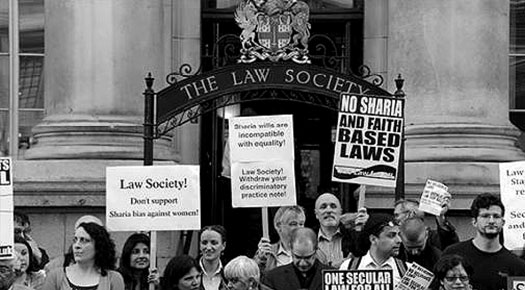
The UK Law Society has rescinded its practice note relating to the drawing up of Sharia compliant wills. Such wills stated that “illegitimate and adopted children are not Sharia heirs. … The male heirs in most cases receive double the amount inherited by a female heir. … Non-Muslims may not inherit at all. … a divorced spouse is no longer a Sharia heir. …” This has been welcomed by many as the UK’s legal sector finally making a statement against the practicing of Sharia in Britain.
The campaign against the guidance included groups such as South Hall Black Sisters, One Law for All, and equality and social justice campaigners across a diverse scope of representation, from LGBT rights activist Peter Tatchell to feminist comedienne Kate Smurthwaite. They recognised the problem with according special legal privilege based on Sharia within the UK, as set out in a letter to the Law Society and former United Nations Special Rapporteur on Freedom of Religion or Belief. It even makes no sense to many believers, who wonder why they should be accountable to different laws than their fellow British citizens. Such leanings might also be considered a disastrous blow for many who have fled countries with such judicial proclivities, just to find them appearing in the UK. In fact, right now there is even a discussion trending on social media relating to the rejection of Sharia by the very people living in conservative Islamic countries!
This victory for equality under law has led one of the campaign organisers, Mr. Chris Moos, to remind us that: “The only way public bodies and representative organisations can be sure to meet their equality duties is by adhering to the principle of secular neutrality in matters of belief.” This is of course true; it is almost inevitable that endorsing a religious model of social and political organisation, will end up elevating the rights of the group creating it beyond those of others. It’s also worth noting that Secular neutrality doesn’t entail discrimination against religious groups: Christian, Islamic, Hindu or any other. Rather, it tries to safeguard members of those groups, and those outside of them from the discriminatory beliefs and practices contained within. This is done by ensuring one rule of law for all, rather than separate laws for some, based on an ambiguous religious system like Sharia, where there is no consensus even from those who use it.
I am particularly encouraged by the grace with which the law society has acknowledged its mistake and the unreserved way they have apologised. They are to be commended for this, and hopefully will commit to never again producing such guidance. It is all too easy to buckle under the pressure of particular vocal elements of conservative religious groups, who claim they are discriminated against when people challenge illiberal practices.
This welcome reversal follows a similar example, in which the National Union of Students and Universities UK supported guidance allowing gender segregation on religious grounds in UK universities. This moral relativism was also backed by well-known conservative groups such as the Federation of Islamic Student Societies (FOSIS), and the Islamic Education and Research Academy (iERA); iERA’s leadership also conduct apologia for executing LGBT, apostates, and wife beating. This affront to equality, whilst receiving condemnation from the Prime Minister, was much less unequivocal than the law society’s brave stand though.
We should always remember, that there are those who will seek to erode the positive developments we have made in relatively free and liberal societies. The UK is trying to be a tolerant society, but we should never be cowed into being tolerant of the intolerant due to particular niche views. It reminds me of the words of the Humanist Aldous Huxley, and others who have echoed this sentiment: “Eternal vigilance is not only the price of liberty; eternal vigilance is the price of human decency.”
Photo Credits: The Economist
